 Petzlover
Petzlover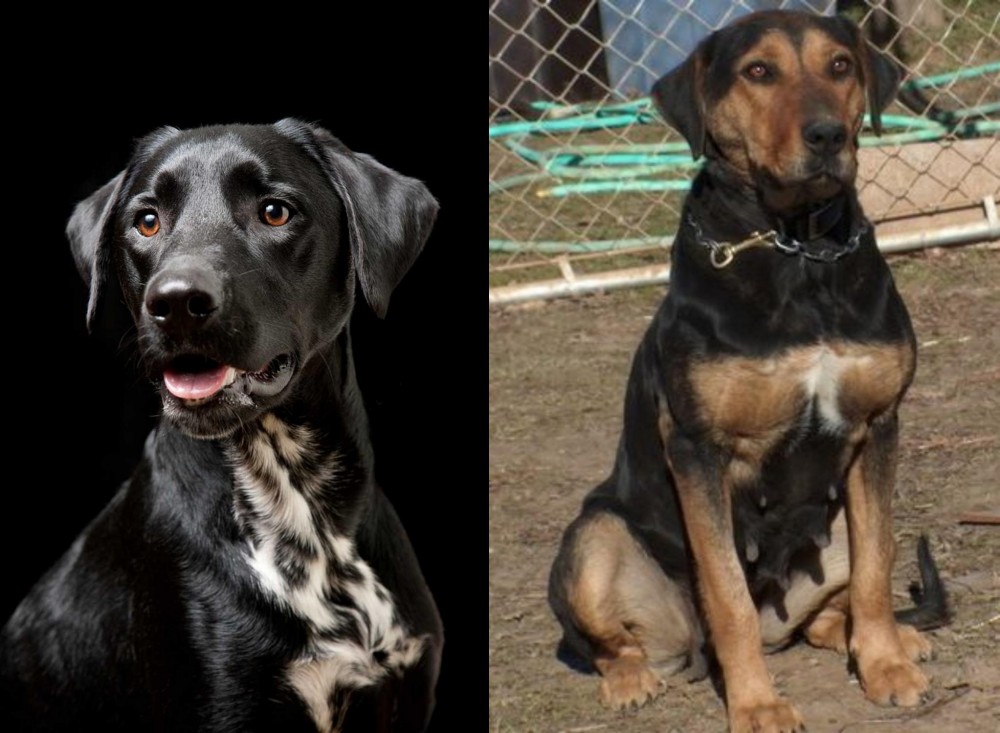 Dalmador is originated from United States but New Zealand Huntaway is originated from New Zealand. Both Dalmador and New Zealand Huntaway are having almost same height. Dalmador may weigh 8 kg / 17 pounds lesser than New Zealand Huntaway. Both Dalmador and New Zealand Huntaway has same life span. Both Dalmador and New Zealand Huntaway has almost same litter size. Both Dalmador and New Zealand Huntaway requires Moderate Maintenance.
Dalmador is originated from United States but New Zealand Huntaway is originated from New Zealand. Both Dalmador and New Zealand Huntaway are having almost same height. Dalmador may weigh 8 kg / 17 pounds lesser than New Zealand Huntaway. Both Dalmador and New Zealand Huntaway has same life span. Both Dalmador and New Zealand Huntaway has almost same litter size. Both Dalmador and New Zealand Huntaway requires Moderate Maintenance.
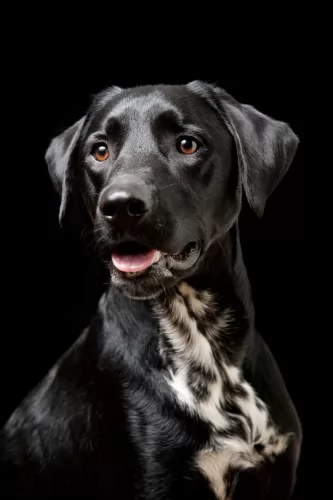 The Dalmador is a cross-breed – a mix between a Dalmation and a Labrador, and because it is a a fairly new breed you won’t find much information about the dog’s origins.
The Dalmador is a cross-breed – a mix between a Dalmation and a Labrador, and because it is a a fairly new breed you won’t find much information about the dog’s origins.
We do know that the Labrador originated in Canada and that the Dalmation comes from Croatia. Both these dog breeds have their own interesting histories. The Dalmador is a hybrid dog and isn’t a member of the American Kennel Club.
They started coming about from the 1980s when mixing one pure-breed dog with another became popular.
 The New Zealand Huntaway was developed in New Zealand. The dog was brought about by mixing the Border Collie with a number of other breeds, of which the Doberman Pinscher is one.
The New Zealand Huntaway was developed in New Zealand. The dog was brought about by mixing the Border Collie with a number of other breeds, of which the Doberman Pinscher is one.
The idea was to have a skilled herding dog for livestock, and the Huntaway is known for its loud bark which it uses to herd.
The dog is looked upon as as a fairly new breed, dating from the late 19th century. These days it is a popular companion dog, and in 2013 was recognized by the New Zealand Kennel Club.
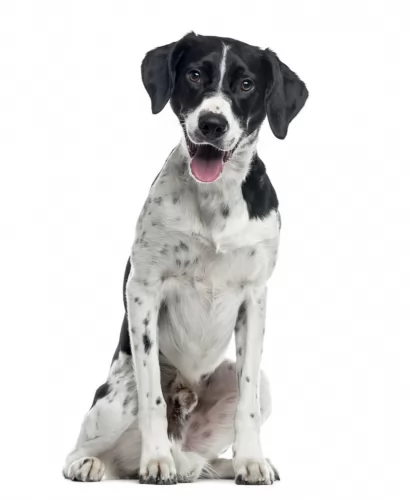 The Dalmador is a cross breed dog which comes from crossing the Labrador Retriever with a Dalmatian. The result is a muscular, well proportioned body.He has floppy ears and a long tail.
The Dalmador is a cross breed dog which comes from crossing the Labrador Retriever with a Dalmatian. The result is a muscular, well proportioned body.He has floppy ears and a long tail.
He is medium to large sized dog and can stand up to 58cm in height and weigh between 25 and 32kg. No two dogs look the same and some dogs gravitate more towards the one breed while others toward the other.
Most Dalmadors have the spotted coat, although the coat could have very visible spots or maybe just a few dots on the fur. Then again there are some Dalmadors where the coat is more of a solid color in brown or black or cream with some white patches. The double coat is short and dense and he is quite a heavy shedder.
The Dalmador is a gentle, friendly dog, making him a great family pet. You can’t really say exactly what temperament your Dalmador will have as he could inherit either the Dalmatian’s more aloof nature or he could inherit the friendly character of the Labrador.
He is quite likely to be even-tempered and is amicable with other pets in the home. He is alert too and this makes him a good watchdog. Because the Dalmador is the hybrid of two active, alert, intelligent breeds you can expect a dog which for some will be quite a handful. It is why training and socialization can be excellent for the Dalmador as it will calm him down, turning him into an obedient dog who comes and sits when told.
If you’re looking for an energetic, active and highly social dog, the Dalmador will suit an active family that can join in with all his high jinks.
 As a deep chested, medium to large sized dog, the New Zealand Huntaway stands at between 50 and 60cm and weighs roughly 25 to 40kg.
As a deep chested, medium to large sized dog, the New Zealand Huntaway stands at between 50 and 60cm and weighs roughly 25 to 40kg.
The eyes are soft and kind. The coat is usually black and tan colored, although it can be brindle too. The coat is in different textures and can be mostly smooth, but also fairly rough textured. The ears are usually medium length and floppy, the legs straight and long and the tail is long.
These dogs are good natured and are guaranteed to make a splendid family pet. Because they have always been used to life in the country, they are more suited to this lifestyle than for living in the city.
They are friendly, energetic dogs and will require a good deal of exercise.They don’t take easily to lying around bored and this lifestyle will just lead to frustration and destructive behavior, through no fault of their own.
Just like with any other dog, the New Zealand Huntaway will need to be trained and socialized so that he becomes obedient and well rounded. This is necessary for him as he is an independent canine with a determined streak.
His intelligence will mean he is able to learn easily. He also is gentle and kind-hearted, and gets on well with kids and pets in the home.
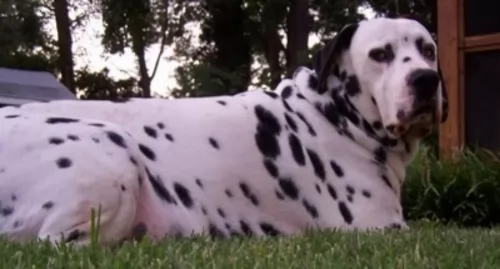 The wonderful Dalmador is such a easy-going, cheerful dog full of surprises really, as you never know which dominant traits he will inherit from either of the two dogs involved in his making.
The wonderful Dalmador is such a easy-going, cheerful dog full of surprises really, as you never know which dominant traits he will inherit from either of the two dogs involved in his making.
Friendly and social, he loves his human family and is totally loyal and loving toward them. Even tempered and faithful, if you’re looking for a wonderful 4-legged friend and companion, the Dalmador promises to make you a splendid pet.
 The Huntaway has got so much going for him to make him a splendid family pet. Not only is he intelligent, but he is evenly balanced, friendly, social and active.
The Huntaway has got so much going for him to make him a splendid family pet. Not only is he intelligent, but he is evenly balanced, friendly, social and active.
He can easily be trained and socialized. He is friendly and gentle with other pets in the home as well as with children. With a firm, fair, kind, patient and consistent owner in his life, this dog with the gentle brown eyes will be a fantastic pet for you.
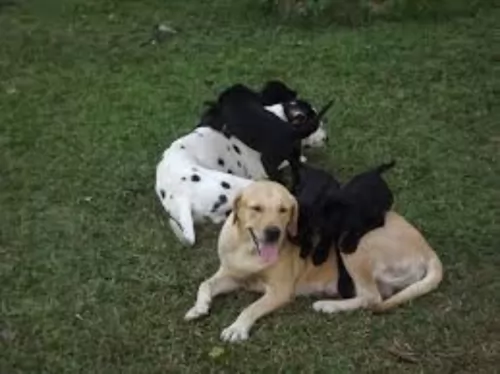 The Dalmador is a hybrid dog and they don’t experience the same health issues that the pure bred dog contends with. The Dalmador has a life expectancy of 10 to 14 years and he can reach this age if you give him all the doggy care he deserves as a 4-legged member of your family.
The Dalmador is a hybrid dog and they don’t experience the same health issues that the pure bred dog contends with. The Dalmador has a life expectancy of 10 to 14 years and he can reach this age if you give him all the doggy care he deserves as a 4-legged member of your family.
Apart from a common dog ailment – hip dysplasia, bloat and obesity are also common problems for your dog.
Bloat is a serious health condition that can actually be fatal because its a twisted stomach where trapped gas puts pressure on the diaphragm.
You will notice the swollen stomach of your pet. Larger breeds are more prone to suffer from bloat because of being deep-chested. Also known as gastric dilatation-volvulus, a vet will need to intervene with this ailment as it can be life-threatening.
 The Huntaway is the kind of dog that won’t require you having to rush off to the vet with him. Good care with nutritious food and exercise can see him reaching 14 years of age or so.
The Huntaway is the kind of dog that won’t require you having to rush off to the vet with him. Good care with nutritious food and exercise can see him reaching 14 years of age or so.
Some common dog illnesses to look out for include -
This disease is about degeneration of the heart muscle with the muscle becoming thinner. The pressure of the blood inside the heart causes these thin walls to stretch, resulting in the heart becoming enlarged.
Although heart disease develops slowly, severe congestive heart failure can develop quickly and you may notice rapid breathing and a blue tongue. It is imperative to get your pet to the vet immediately.
Small studies have revealed that the rate of Dilated Caridomyopathy could be higher in Huntaways.
This is an issue where the hips haven’t formed properly. Affected dogs lose their mobility and battle with pain and lameness. Certainly you will need to get your pet to the vet to make sure that he is pain-free and comfortable.
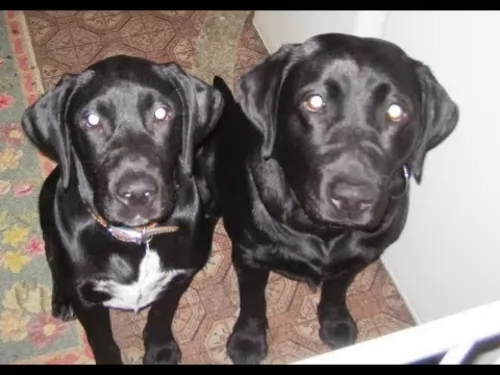 The Dalmador is a medium to large dog so you want to be feeding him one or two bowls of food a day. You want to be giving your Dalmador top-quality food to ensure good health. The lower quality foods are inclined to have ingredients in them that aren’t good for your pet.
The Dalmador is a medium to large dog so you want to be feeding him one or two bowls of food a day. You want to be giving your Dalmador top-quality food to ensure good health. The lower quality foods are inclined to have ingredients in them that aren’t good for your pet.
Always try to include some home-made food into your pet’s diet such as cooked brown rice, cooked chicken and vegetables. You can mix this into some of his dry kibble. It is important to include some raw meat into his diet from time to time as well.
Clean water must be constantly available. Without good quality food and water, you jeopardize the health of your pet.
He isn’t going to require much maintenance so a good brush twice a week will rid him of loose hairs and keep his coat shiny and glossy.
Other things to check regularly are his ears and to brush his teeth 2 or 3 times a week. Don’t neglect giving him a good amount of exercise too.
 This dog is an average shedder and fairly low maintenance, requiring you to brush him twice a week to keep the coat shiny and free from loose hairs.
This dog is an average shedder and fairly low maintenance, requiring you to brush him twice a week to keep the coat shiny and free from loose hairs.
Dogs that have floppy- or folded ears need to have their ears checked for infection as well as their eyes. They also need to have the nails trimmed as left long, they can hook onto things which can rip into the dog’s flesh.
The Huntaway is a herding dog, and even though your dog today is more of a companion dog, he will need to be fed a high-quality commercial dog food which has been particularly formulated for active working dog breeds.
It is a good idea to sometimes break away from a bowl of kibble and to mix in some homemade food. The simpler the better for your dog, and boiled chicken, some brown rice or pasta and some vegetables such as sweet potato, carrots and spinach mixed into his kibble occasionally will do him the world of good.
Now and then you can also add in some raw meat if possible. Avoid exotic, spicy foods with your pet to avoid digestive problems.
This dog has always been a hunting, herding dog so it is going to require a lot of exercise to keep him content and happy.
He won’t only need physical exercise but will also need mental stimulation as he is an intelligent dog too. Apart from taking him for walks and giving him ball- and rope games, for mental stimulation, why not consider some food puzzle toys?
These are sturdy containers that hold dog food and treats inside. Dogs have to paw at it, lick, shake and think up ways to get at the tasty treat. These food puzzle toys will keep your pet occupied for a while and keep him happily thinking.